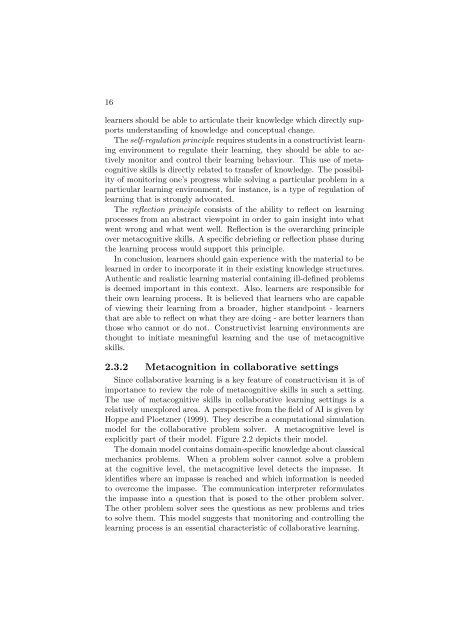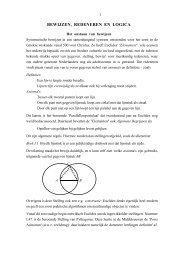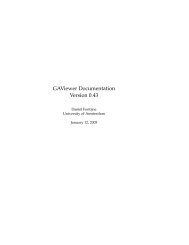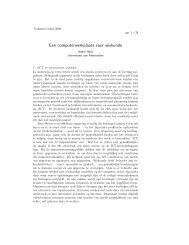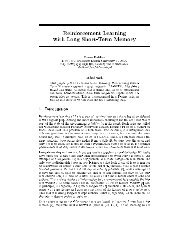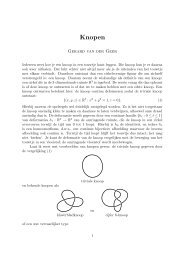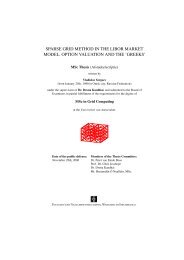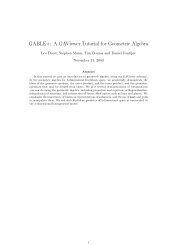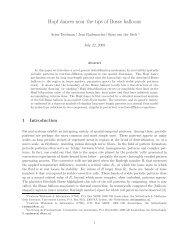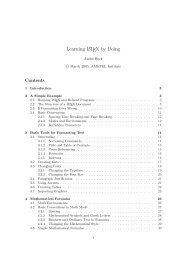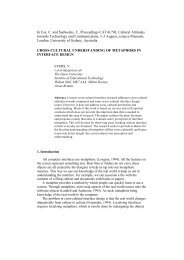The role of metacognitive skills in learning to solve problems
The role of metacognitive skills in learning to solve problems
The role of metacognitive skills in learning to solve problems
You also want an ePaper? Increase the reach of your titles
YUMPU automatically turns print PDFs into web optimized ePapers that Google loves.
16<br />
learners should be able <strong>to</strong> articulate their knowledge which directly supports<br />
understand<strong>in</strong>g <strong>of</strong> knowledge and conceptual change.<br />
<strong>The</strong> self-regulation pr<strong>in</strong>ciple requires students <strong>in</strong> a constructivist learn<strong>in</strong>g<br />
environment <strong>to</strong> regulate their learn<strong>in</strong>g, they should be able <strong>to</strong> actively<br />
moni<strong>to</strong>r and control their learn<strong>in</strong>g behaviour. This use <strong>of</strong> <strong>metacognitive</strong><br />
<strong>skills</strong> is directly related <strong>to</strong> transfer <strong>of</strong> knowledge. <strong>The</strong> possibility<br />
<strong>of</strong> moni<strong>to</strong>r<strong>in</strong>g one’s progress while solv<strong>in</strong>g a particular problem <strong>in</strong> a<br />
particular learn<strong>in</strong>g environment, for <strong>in</strong>stance, is a type <strong>of</strong> regulation <strong>of</strong><br />
learn<strong>in</strong>g that is strongly advocated.<br />
<strong>The</strong> reflection pr<strong>in</strong>ciple consists <strong>of</strong> the ability <strong>to</strong> reflect on learn<strong>in</strong>g<br />
processes from an abstract viewpo<strong>in</strong>t <strong>in</strong> order <strong>to</strong> ga<strong>in</strong> <strong>in</strong>sight <strong>in</strong><strong>to</strong> what<br />
went wrong and what went well. Reflection is the overarch<strong>in</strong>g pr<strong>in</strong>ciple<br />
over <strong>metacognitive</strong> <strong>skills</strong>. A specific debrief<strong>in</strong>g or reflection phase dur<strong>in</strong>g<br />
the learn<strong>in</strong>g process would support this pr<strong>in</strong>ciple.<br />
In conclusion, learners should ga<strong>in</strong> experience with the material <strong>to</strong> be<br />
learned <strong>in</strong> order <strong>to</strong> <strong>in</strong>corporate it <strong>in</strong> their exist<strong>in</strong>g knowledge structures.<br />
Authentic and realistic learn<strong>in</strong>g material conta<strong>in</strong><strong>in</strong>g ill-def<strong>in</strong>ed <strong>problems</strong><br />
is deemed important <strong>in</strong> this context. Also, learners are responsible for<br />
their own learn<strong>in</strong>g process. It is believed that learners who are capable<br />
<strong>of</strong> view<strong>in</strong>g their learn<strong>in</strong>g from a broader, higher standpo<strong>in</strong>t - learners<br />
that are able <strong>to</strong> reflect on what they are do<strong>in</strong>g - are better learners than<br />
those who cannot or do not. Constructivist learn<strong>in</strong>g environments are<br />
thought <strong>to</strong> <strong>in</strong>itiate mean<strong>in</strong>gful learn<strong>in</strong>g and the use <strong>of</strong> <strong>metacognitive</strong><br />
<strong>skills</strong>.<br />
2.3.2 Metacognition <strong>in</strong> collaborative sett<strong>in</strong>gs<br />
S<strong>in</strong>ce collaborative learn<strong>in</strong>g is a key feature <strong>of</strong> constructivism it is <strong>of</strong><br />
importance <strong>to</strong> review the <strong>role</strong> <strong>of</strong> <strong>metacognitive</strong> <strong>skills</strong> <strong>in</strong> such a sett<strong>in</strong>g.<br />
<strong>The</strong> use <strong>of</strong> <strong>metacognitive</strong> <strong>skills</strong> <strong>in</strong> collaborative learn<strong>in</strong>g sett<strong>in</strong>gs is a<br />
relatively unexplored area. A perspective from the field <strong>of</strong> AI is given by<br />
Hoppe and Ploetzner (1999). <strong>The</strong>y describe a computational simulation<br />
model for the collaborative problem <strong>solve</strong>r. A <strong>metacognitive</strong> level is<br />
explicitly part <strong>of</strong> their model. Figure 2.2 depicts their model.<br />
<strong>The</strong> doma<strong>in</strong> model conta<strong>in</strong>s doma<strong>in</strong>-specific knowledge about classical<br />
mechanics <strong>problems</strong>. When a problem <strong>solve</strong>r cannot <strong>solve</strong> a problem<br />
at the cognitive level, the <strong>metacognitive</strong> level detects the impasse. It<br />
identifies where an impasse is reached and which <strong>in</strong>formation is needed<br />
<strong>to</strong> overcome the impasse. <strong>The</strong> communication <strong>in</strong>terpreter reformulates<br />
the impasse <strong>in</strong><strong>to</strong> a question that is posed <strong>to</strong> the other problem <strong>solve</strong>r.<br />
<strong>The</strong> other problem <strong>solve</strong>r sees the questions as new <strong>problems</strong> and tries<br />
<strong>to</strong> <strong>solve</strong> them. This model suggests that moni<strong>to</strong>r<strong>in</strong>g and controll<strong>in</strong>g the<br />
learn<strong>in</strong>g process is an essential characteristic <strong>of</strong> collaborative learn<strong>in</strong>g.


